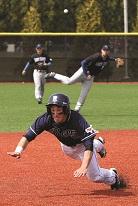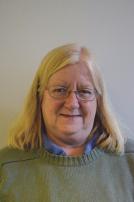
It’s spring—or at least nearly spring, and we’re starting to hear the signs of the earth’s reawakening: robins trilling, creeks trickling, the scrape of wire brush against barbecue grill, and the slap of cowhide ball against leather glove. It’s time for baseball! Even better news? There are cities all over the country waiting to be your home plate.

Just north of Austin is Round Rock, the city that bills itself as the “Sports Capital of Texas.” That’s a serious statement in a sports-centric state, but Round Rock can back it up. The city is home to a 570-acre outdoor sports complex called Old Settlers Park, boasting 20 baseball fields and five softball fields, as well as soccer fields, cricket fields, horseshoe pavilions, playgrounds, disc golf, barbecue pits and more.
Nearby is the Dell Diamond, the home of the Triple-A Round Rock Express, top farm club of the Texas Rangers. The Dell Diamond is first-class in every way, and it is available for championship games, depending on the Express schedule.
“We have officials volunteer for the championship games because they want to work at the Dell Diamond,” says Nancy Yawn, director of the Round Rock Convention and Visitors Bureau.
Round Rock routinely hosts Super Series youth baseball tournaments of 100 to 150 teams. “We have that down,” adds Yawn. “We run [Super Series] World Series, Nationals—we are very good at baseball and softball.”
Old Settlers Park is built upon dead level Texas limestone. The infields are skinned and the grass is lush. The seating is comfortable, and there are even concession stands.
The Round Rock Convention and Visitors Bureau can offer assistance in organizing, accommodations and logistics. “We have a great relationship with our city management and our hotels,” says Yawn. “They are absolutely friendly and they love our teams.”
As far as Round Rock is concerned, the bigger the tournament the better. “For national tournaments, the whole family comes. Round Rock is very family-friendly. It’s a safe city and a great experience,” says Yawn.
Laredo, Texas
Additional Texas-size baseball awaits planners who make the trip to Laredo. The Laredo Convention and Visitors Bureau has a website map showing the location of various sports facilities. The AA-League Laredo Lemurs play at the new Uni-Trade Baseball Stadium, which has a 6,500-spectator capacity.
The Texas A&M International University (TAIMU) Dustdevils, meanwhile, have their home plate at the Haynes Baseball Field. Laredo Community College's baseball team plays and trains at the Fort McIntosh Campus, location of the Dr. Crispin Sanchez Baseball Field at the LCC Sports and Recreation Center.
Need more? Laredo can host games at diamonds found in Taylor Battlefield, Rangel Field, St. James Community Baseball Fields, Hillside Baseball Fields and Slaughter Park Sports Complex. There's also plenty of softball action at TAIMU Dustdevil Field, the UISD (United Independent School District) Student Activity Center Complex and M.E. Benavides Park.

Providence “is not blessed with huge sports complexes like some places have,” says John Gibbons, executive director of the Rhode Island Sports Commission. But the area has plenty of fields for all levels of play, many within walking distance and all within a short drive.
Residents of Providence and environs absolutely love baseball. It is very near the heart of Red Sox Nation, and the Red Sox are very close to Rhode Islanders’ hearts: the Pawtucket Red Sox (AAA) routinely sell out their games, as do the Newport Gulls of the New England Collegiate Baseball League.
The Sen. John H. Chafee Athletic Complex in Cranston, about five miles from downtown, hosts the New England and Mid-Atlantic Little League tournament for 9-10 year-olds. Twelve state champion teams play off for the right to represent their region in the championship game, which for the 9-10 year olds (a very big deal, since Little League World Series play is for 12-year-olds).
“It’s a very nice tournament,” says Gibbons. “They’re here for about a week playing baseball and enjoying themselves.” Chafee has hosted the tournament for three years, and has just re-upped for another year.
Over in Newport, about 40 minutes from Providence by car, is Cardines Field, a wooden bandbox, former sandlot and quite possibly the oldest ballpark in the United States, now home to the Newport Gulls. Cardines is available for championship games, depending on the Gulls’ schedule, and teams that play there get the entire nostalgic baseball experience—wooden bleachers, advertising signs in the outfield, and a roster of famous former players. Yogi Berra, Bob Feller, Phil Rizzuto and Larry Doby all played there in the Sunset League while serving in the U.S. Navy.
“Baseball runs very deep here,” says Gibbons, “but softball is big too. It’s very popular with the girls.”
North Platte, Nebraska
You can discover plenty of baseball in North Platte, Nebraska. The Visit North Platte website offers a glimpse into the wide variety of facilities available.
Two lighted playing fields (one softball and one Legion Ball) are available at Hershey Ball Park, which has room for 160 spectators, as well as concession, storage and warm-up facilities. Palmer Park has Legion-sized baseball /softball facilities with covered dugouts, space for 160 spectators, equipment storage, warm-up areas, scoreboard and announcing capabilities.
Bill Wood Field, a designated baseball facility, has a lighted baseball diamond and and dressing rooms. The facility is used for American Legion baseball play. Sutherland Ball Field has a variety of fields, plus announcing capabilities. The Dowhower Softball Complex, meanwhile, has seven lighted diamonds that see year-round use for league play by the Platte Valley Girls Softball Association.

When in Rome, (Georgia) play ball. That’s the message from the Greater Rome Convention and Visitors Bureau, where Ann Hortman is sports and events coordinator.
The area boasts four parks with 18 game-level fields for baseball, and two parks with 10 game-level fields for softball. They are natural grass, and most of them are owned and maintained by the local Rome/Floyd Parks & Recreation Authority and the Rome/Floyd YMCA.
Rome also boasts Miracle Field at State Mutual Stadium, a latex-free, fully accessible, lighted rubber field for players who are physically and developmentally challenged. It is next to State Mutual, home of the Rome Braves single-A Atlanta affiliate, and the team works closely with the Miracle League, which organizes games for players with or without disabilities.
The town is nestled in the foothills of the Appalachian Mountains and the center of a triangle formed by Atlanta, Chattanooga, Tennessee and Birmingham, Alabama. The area is home to Shorter University (NCAA Div. II) and Berry College (NCAA Div. III), both of which have excellent baseball and softball teams and complete training facilities.
Last year, Rome hosted the collegiate Gulf South Conference (Division II) Baseball Championships at State Mutual, and it has hosted many youth baseball tourneys, including Dizzy Dean League and USSSA. It's also a softball haven.
“The Greater Rome CVB works in tandem with the facility owners and event planners to ensure a successful event,” says Hortman.
The CVB staff will assist with bid proposals, and once the bid is secured, the staff can help with hotel accommodations and rates, publicity, organization and suppliers. Hortman also mentions the area’s dedicated and active volunteer community, ready to help when called upon.

Lubbock pulls out all the stops for tournaments. Visit Lubbock, the city’s convention and visitors bureau, has a two-man sports crew that recruits and organizes tournaments year-round. They can host some big tournaments with their 16 youth fields and 12 high school fields, not to mention the fields available at its colleges and universities, which include sports powerhouses Texas Tech and Lubbock Christian University.
In the summer, Lubbock hosts four high school tournaments with 36 to 54 teams each. “We do the whole enchilada for them—hotel rooms, round up officials, take care of the dignitaries, secure the facilities, arrange the hospitality and coaches’ gifts, organize the World Series at the end of the year and host a social for all the players,” says Scott Harrison, sports director.
The area also hosts at least five youth tourneys every year with 100-120 teams each. “We like to be busy,” says Harrison.
Once the contract is signed, the Lubbock CVB unleashes its marketing and press team to attract media and spectators to the tourney. The team prints T-shirts, posts on social media sites like Facebook, Twitter and Foursquare, and plies its media contacts to ensure a successful, well-attended event.
Holly Givens, director of marketing and communications, notes one of Lubbock’s biggest attractions for fans and youth baseball players: the Texas Panhandle city is home to the National Collegiate Baseball Hall of Fame, and is currently raising $13 million to build a new headquarters and baseball field. In fact, a $5 million donation from the Moody Foundation has just rolled in, and the city is due to break ground on the project in July 2013.
“It will be huge once we get it built,” says Harrison. “It will help draw more teams to town. It opens avenues all the way to the farm clubs and minor league exhibitions.”

Don Schumacher, executive director of the National Association of Sports Commissions, knows his facilities, and he has pronounced Rapid City’s baseball fields good—better than good. “Rapid City houses one of the best baseball complexes we have ever seen. You just don’t find three baseball facilities of that caliber sharing one parking lot anywhere,” he says.
Schumacher is speaking of Floyd Fitzgerald Stadium, McKeague Field and Pete Lien Field, three diamonds that share a 725-car parking lot near the heart of town. Fitzgerald seats 3,500-4,000, McKeague 300 and Lien 500. All have a great view of the Black Hills.
Most of those seats are full for American Legion games as well as amateur games, says Domico Rodriguez, sports and events sales director for the Rapid City Convention and Visitors Bureau: “In the summer, Rapid City is a baseball town.”
Also available is Jackson Park, with 11 youth fields. Two blocks from there are 14 more youth fields. “A lot of our athletes play baseball exclusively in the summer,” says Rodriguez. Rapid City's Post 22 American Legion team is a past national champion, and that the city has hosted the national tournament several times, the last in 2005. And softball facilities -- and action -- are plentiful too.

“We play a lot of baseball and softball in the Pacific Northwest,” says Sue Harshbarger, director of sports sales and development for Eugene, Cascades & Coast Sports. “What sets us apart is, we’re a destination. We’re very family-friendly, and we have a very strong legacy of hosting great sports events.”
She says the area hosts many teams from the desert Southwest looking to escape their summer heat and play ball in the cooler breezes between the Pacific Ocean and the Cascades Range.
The crown jewel of Eugene’s baseball fields is PK Park, where the Eugene Emeralds, a single-A short-season farm team of the San Diego Padres, play. True to form in eco-conscious Eugene, PK Park is LEED-Silver-certified, and also boasts a high-definition video board, digital scoreboard and skyboxes. PK Park seats 4,000. Eugene also offers seven youth diamonds, a high school field that seats 800 and the University of Oregon’s ballpark, which seats 3,900.
The CVB team at Eugene, Cascades & Coast offers plenty of help to tournament directors, and Harshbarger says that the area offers its own sights and attractions. “There is always something more to add to the experience,” she adds.
If you are planning a baseball or softball tournament, all these cities and towns have plenty of fields to play upon, and lots of family activities to enjoy just a long fly ball away.

